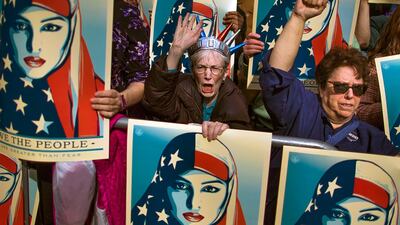Issa Aldabaan has only ever known America under the presidency of Donald Trump, a country that told him time and time again in words and political actions that he was not welcome.
"I came here under Trump," said Mr Aldabaan, a refugee from Syria. "I didn't see America before Trump.
"My friends told me, ‘This is not America, we are better than this'.”
Mr Aldabaan, 36, and his wife and three children fled the Syrian civil war in 2014.
After two years in Jordan, they arrived in Connecticut on November 8, 2016, the day Mr Trump was elected.
A few months later, Mr Trump signed an executive order banning refugees and residents of seven Muslim-majority countries, including Mr Aldabaan’s native Syria.
US courts found the travel order to be discriminatory, but the administration kept adjusting it, adding more countries, some of them not Muslim-majority, until the Supreme Court upheld it in 2018.
That ruling effectively cut Mr Aldabaan off from his mother, sister and two brothers, who have been stuck in Jordan since 2014.
“My mother was sad when Trump became president," he said. "She said, ‘I think I will never see you again'.”
Not seeing his family for so long has been a challenge.
“We haven’t seen them since 2016 and we can’t travel to visit them because we’ve been scared that maybe they won't allow us back into the US,” Mr Aldabaan said.
But now, for the first time since he arrived in New Haven, Connecticut more than five years ago, he has hope.
President Joe Biden fulfilled one of his campaign promises and signed an executive order to reverse Mr Trump's "Muslim ban".
“It repeals Proclamations 9645 and 9983, which restrict entry into the United States from primarily Muslim and African countries," the White House said.
It also "instructs the State Department to restart visa processing for affected countries and to swiftly develop a proposal to restore fairness and remedy the harms caused by the bans, especially for individuals stuck in the waiver process and those who had immigrant visas denied".
That means Mr Aldabaan's mother, sister and brothers could have progress on their refugee applications.
“They are happy now, and I pray and hope we will all be together soon,” he said.
Under Mr Trump, the US drastically lowered the number of refugees it took in.
Throughout most of the 2000s, the country took in more than 70,000 refugees a year, but in 2020, Mr Trump’s last year in office, it took in less than 12,000.
“Suddenly, the ladder was pulled up and virtually zero Syrian refugees have come since Trump was elected,” said Chris George, the executive director of Integrated Refugee and Immigrant Services, which helped to resettle the Aldabaan family in the US.
"So hopefully we’ll see a quick restart of the refugee resettlement programme."
Mr Biden pledged to increase the number of refugees to 125,000 a year.
For Mr George and his organisation, that means getting back to work.
“We have the resources and capacity to resettle more than 500 refugees every year," he said.
"That’s what we did in 2016, 530, and we can do that again. We should be doing that every year.
"Connecticut should be welcoming 1,000 refugees a year. It’s nothing for a state of 3.3 million with all of the resources we have."
Muslim communities across the US expressed relief that an ugly chapter had ended, but some Muslim Americans continue to be wary, even of the new administration.
“Time and time again, when it comes to different administrations that we have experienced as Muslim Americans, as immigrants, I think there are a lot of promises that have not been kept,” said Lela Ali, policy director at Muslim Women For, in Raleigh, North Carolina.
"And I think not enough has been done for our community and our people to make sure that we are protected, that we are safe here and abroad."
Ms Ali is pleased with the Biden administration’s decision to reverse the ban but said it would not erase the pain it had already caused.
“We have to realise and understand and recognise that it doesn’t undo the damage and harm that has been done to the folks who have been directly impacted by this ban."
Mr Aldabaan and his family will never get back the five years they spent apart, but they now have hope that they may one day be reunited.
A security guard in New Haven, he recently obtained his high school equivalency diploma and hopes to go to university to study accounting.
This may prove to be a monumental year for Mr Aldabaan, who recently welcomed a fourth child.
“I am happy because this year I will become a citizen, and I am glad to become a citizen with a president who I know doesn’t hate me because of my religion or where I come from.”



